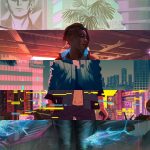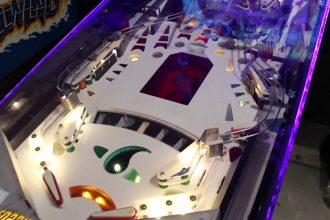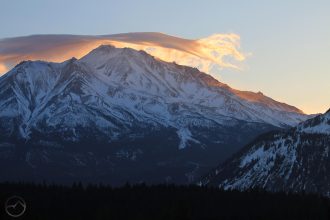1950s UFO Desert Chase – New Retro Sci-Fi Art
“Ford patrol car vs. flying saucer, Nevada 1953—who ya got?”
If you’ve ever dreamed of cruising down a lonely Nevada desert highway in the dead of night, only to look up and find a glowing saucer keeping pace with your headlights—this one’s for you. 1950s UFO Desert Chase is my latest retro-inspired digital illustration, a love letter to Cold War paranoia, classic sci-fi pulp covers, and the gleaming chrome of mid-century automobiles.
Inspiration Stack: Chrome, Kodachrome, and Cosmic Panic
Every good retro sci-fi piece begins with research, and this one was no exception. My “inspiration stack” leaned heavily on a few vintage gems:
- 1956 Ford Mainline brochures – that perfect balance of boxy authority and desert patrol ruggedness.
- LIFE Magazine covers (1947–1955) – when UFO sightings were splashed across newsstands and America’s imagination.
- Atomic-age color palettes – mustard yellows, chrome blues, and dusty pink skies that scream 1950s optimism and paranoia.

The Illustration Pipeline
Building a convincing retro sci-fi scene takes more than just a shiny saucer. I wanted the final artwork to feel like it could have graced the cover of a 1953 pulp magazine or been tucked inside a UFO conspiracy issue of Popular Science. Here’s how I got there:
1. Pencil Thumbnails
I started with a dozen quick sketches—little more than scribbles of horizon lines, glowing domes, and the curve of a Ford’s hood under desert starlight. The key here was mood: do we want a cinematic chase with headlights blazing, or a lonely sheriff watching the saucer hover just out of reach? Ultimately, I chose action—the sheriff in hot pursuit.

2. Color-Blocking with 1950s DuPont Automotive Paints
For authenticity, I referenced DuPont’s mid-century automotive paint chips. The 1950s weren’t shy about color—turquoise, pale yellow, fire-engine red. I blocked the Ford in a two-tone sheriff’s livery, with chrome accents catching starlight. The saucer, by contrast, glows with pale aqua and magenta, tapping into that “otherworldly neon” that film posters loved.
“Color is half the story in retro sci-fi—get it wrong, and it feels like cosplay. Get it right, and you’re in 1953.”
3. Grain Overlay to Mimic ASA-50 Kodachrome
No matter how polished the digital art, it can’t scream “1950s” without texture. I built a custom grain overlay that mimics the fine-but-not-perfect film grain of ASA-50 Kodachrome. Add a little fading on the edges, and suddenly you’re holding a print your grandfather could’ve found tucked inside a diner jukebox.

Behind the Curtain: Faking Vintage Lens Flares
Everyone loves a good lens flare, but 1950s cameras weren’t built like today’s digital glass. To fake that period-correct look, I:
- Overlaid hand-painted radial streaks rather than Photoshop’s default flare.
- Used a warm yellow core and faded edges, instead of hyper-bright digital whites.
- Added a slight chromatic shift, simulating glass imperfections of era lenses.
The result? A subtle glow that feels authentic, like you snapped it with a Kodak Retina on a lonely desert night.
Free Wallpapers: Desktop & Phone
What’s the fun of creating a retro UFO chase if you can’t plaster it across your screen? I’ve exported high-resolution wallpapers for both desktop and mobile.

Should the Sheriff Catch the Saucer?
Art is best when it’s a conversation. For the sequel piece, I’m torn: should the sheriff actually catch the saucer in mid-air, or should the chase remain endless—an eternal Cold War pursuit? That’s where you come in:
Poll: The Sequel Decision
Final Thoughts
1950s UFO Desert Chase isn’t just an illustration—it’s a time capsule. It’s chrome and paranoia, headlights and neon saucers, the optimism and dread of a decade where America was torn between rocket-age wonder and nuclear fear. Whether you see it as pulp entertainment or a slice of cultural history, I hope it takes you somewhere strange and wonderful.










